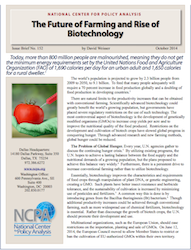 A new report, “The Future of Farming and Rise of Biotechnology,” finds decreasing regulations on genetically modified crops (GMOs) could be a valuable strategy in combating global hunger. The report was released by the National Center for Policy Analysis (NCPA).
A new report, “The Future of Farming and Rise of Biotechnology,” finds decreasing regulations on genetically modified crops (GMOs) could be a valuable strategy in combating global hunger. The report was released by the National Center for Policy Analysis (NCPA).
NCPA Research Associate David Weisser notes that Nobel Prize winner Norman Borlaug’s use of biotechnology has been credited with saving 1 billion lives. “Placing limitations on the advancements of Borlaug and other pioneers only hurts the world’s starving population,” he stressed.
Around the globe, biotech crops have been used to increase the yield of crops used for both food and fuel. The study highlights several key biotech success stories:
- In India, the adoption of biotech cotton has reduced both the need for pesticides and increased agricultural yields, raised the incomes of cotton farmers and farm laborers, and created a more environmentally friendly, technologically advanced agricultural economy.
- Through the use of biotech sugar, Brazil has increased the average annual sugar yield by 20 tons per hectare. The country now produces and uses enough sugarcane ethanol to downgrade gasoline to an alternative fuel.
88 percent of the corn grown in the United States has been altered utilizing biotechnology.
Weisser concluded, “Global hunger will only continue to increase and combating it will not be easy, yet the world is fortunate in that a wealth of research is dedicated to the advancement of farming. Through advanced research and new farming methods, hunger can be fought and conquered.”
